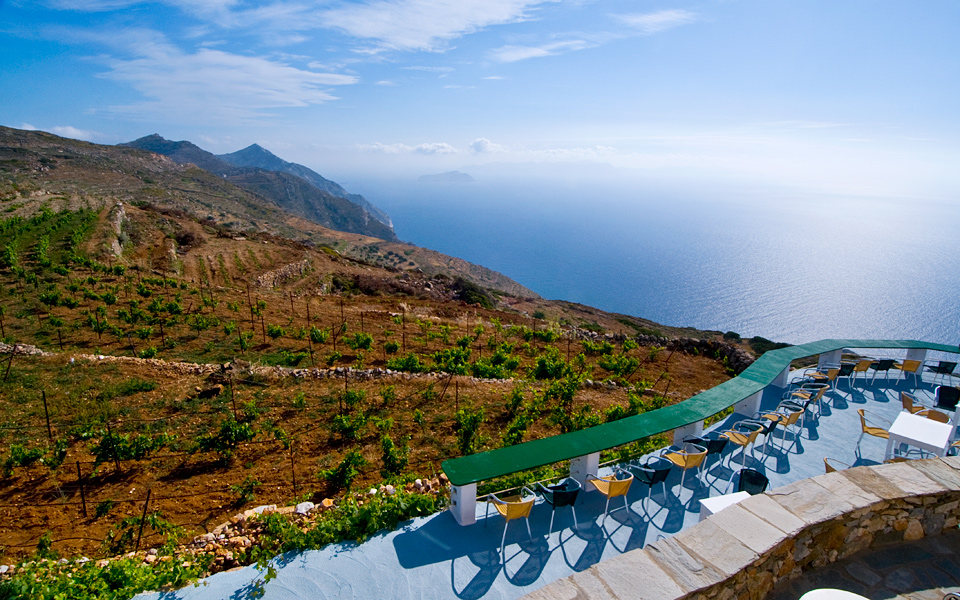Apart from the by now well-travelled Assyrtiko grape of Santorini, other varieties seem to be sprouting up from the dry soil of the Cyclades. If you happen to find yourselves on the islands in September, try to get a sniff of the harvest, of wine making and, naturally, of local wines produced by some of the smallest wineries in the world.
In terms of size, the wineries of the Cyclades do not allow one to speak about wine tourism on any considerable scale – with the notable exception of Santorini. Still, there has been a rise in the production of bottled wines and a turn to quality, which are creating high expectations for the near future. And what’s more, from the focus is not just on Assyrtiko but also on other grape varieties native to the Cyclades, including Monemvasia, Serfiotiko, Athiri, Aidani and Mandilaria.
September is harvest time and activity in the small wineries is in full swing; quite a sight to see. And then there are the terraced slopes where the soil is retained by low dry stone walls; lowland vineyards protected from the northerly winds by double rows of reeds; and vines rolling all the way down to sandy shores. On Santorini you will see them pruned low to grow in basket-like form (kouloures, they are called). And throughout the Cyclades, vines are to this day trained the traditional way, in aplotaries, that practically makes them crawl on the ground to seek protection from the strong winds.
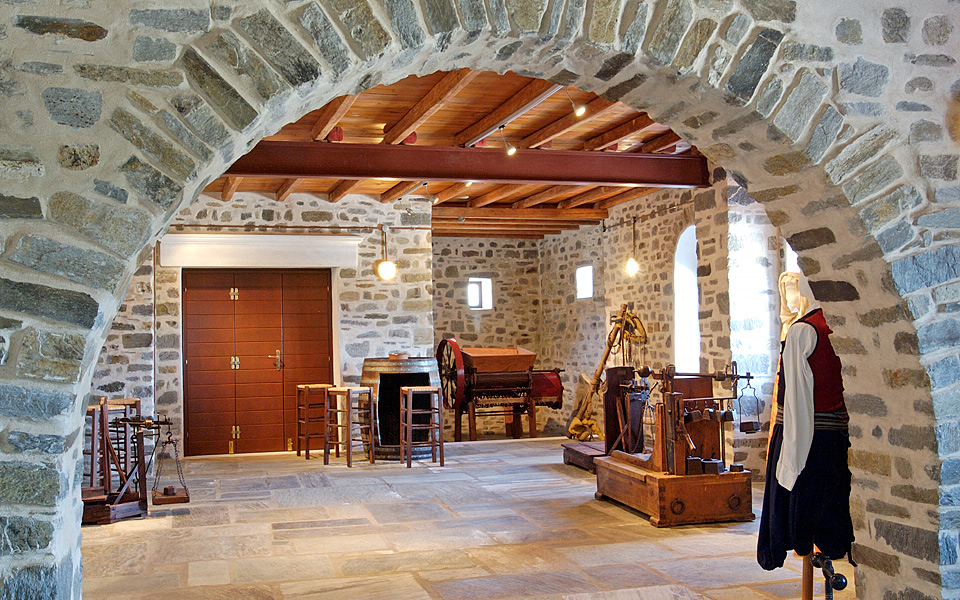
© Efi Paroutsa
1. MORAITIS WINERY, PAROS
Paros is the only island in the Cyclades, Santorini aside, which can pride itself on Protected Designation of Origin (PDO) wine. So, one can officially speak of “Paros” wine, both white and red. White wine is produced from the Monemvasia grape variety and red from Monemvasia and Mandilaria. Owned by Manolis Moraitis and his family, the winery produces two PDO wines along with 11 other labels. With Monemvasia as their flagship variety, the family has been producing wine for over a century. In recent years the winery has been refurbished and modernized, and much of the old equipment is on display on site. Manolis Moraitis has planted some 40 acres of organic vineyards on land he owns at Kamares, Aghioi Anargyroi, Kolympithres, Ambelas, Ysterni, Stavros, Sarakiniko and Leivadia, which he now cultivates with his two sons. He has also been pooling harvests with a group of other growers on Paros, who farm a total of 160 acres, 75 of which are devoted to Monemvasia. On the remaining 85 acres, a number of varieties are grown: Mandilaria, Assyrtiko, Malagousia, Aidani, Malvasia, Sauvignon blanc, Cabernet, Merlot, Syrah, Aidani Black, Athiri Black and Karabraimis. Under the stone arches in the cellar, the white Paros Moraitis and the family’s reds are left to peacefully age in barrels of French oak. Around 500 tonnes of local grapes are vinified annually and the wines are marketed both in Greece and abroad.
[To arrange a visit, call: Tel. (+30) 22840.51350 or (+30) 22840.51706]
2. MORAITIKO, PAROS
With a long history in wine making that goes back generations, the family of Giorgos Moraitis has been producing three wines since 1976. All three are called Moraitiko. The white is a blend of Monemvasia and Malagousia, the red is made from Monemvasia co-fermented with Aidani and Mavrotragano, while the rosé combines Mavrotragano with Malagousia and Monemvasia. All these grape varieties are organically grown in the family’s vineyards, five acres in all, and vinification takes place at a modern winery in the vineyard at Fykia, Naoussa, under the supervision of enologists Tassos Triantafyllou and Giorgos Moraitis. The wines are available at several shops on the island, in Athens and in other parts of Greece.
[To arrange a visit, call: Tel. (+30) 22840.51920]
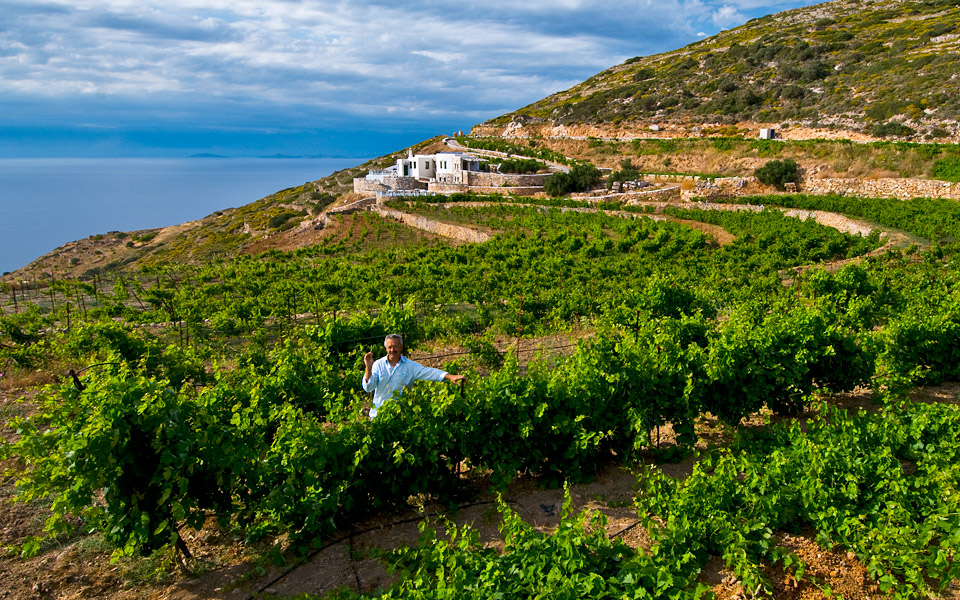
© Clairy Moustafellou
3. MANALIS WINERY, SIKINOS
On the way to Episkopi, southwest of Chora, the main town of Sikinos, lie some five acres of organic vineyards owned by Manalis Winery. For nearly a decade now, the winery has been producing two labels using traditional methods and exclusively renewable energy: En Thermo and En Lefko. Both wines are made from locally grown grapes: the first is a reddish blend of Mandilaria and Assyrtiko, and the second a white blend of Assyrtiko, Aidani and Monemvasia. You can enjoy them while taking in the dreamlike view of the Aegean on the winery’s veranda.
[To arrange a visit, call: Tel. (+30) 6932.272.854-7]
4. KORRES FAMILY WINERY, NAXOS
In recent years, the Korres family has been making three wines on Naxos. There is the red Evi Evan and the rosé Evi Evan, both from the Fokiano grape variety, plus a white Evi Evan, a blend of Muscat, Monemvasia, Savvatiano and Aidani. Total annual production is around 7,000 bottles. The family’s vineyards cover 25 acres, all organic and certified by DIO, which along with the winery are located at Aghia, Koronida.
[To arrange a visit, call: Tel. (+30) 22850.24100 or 6973.330.045]
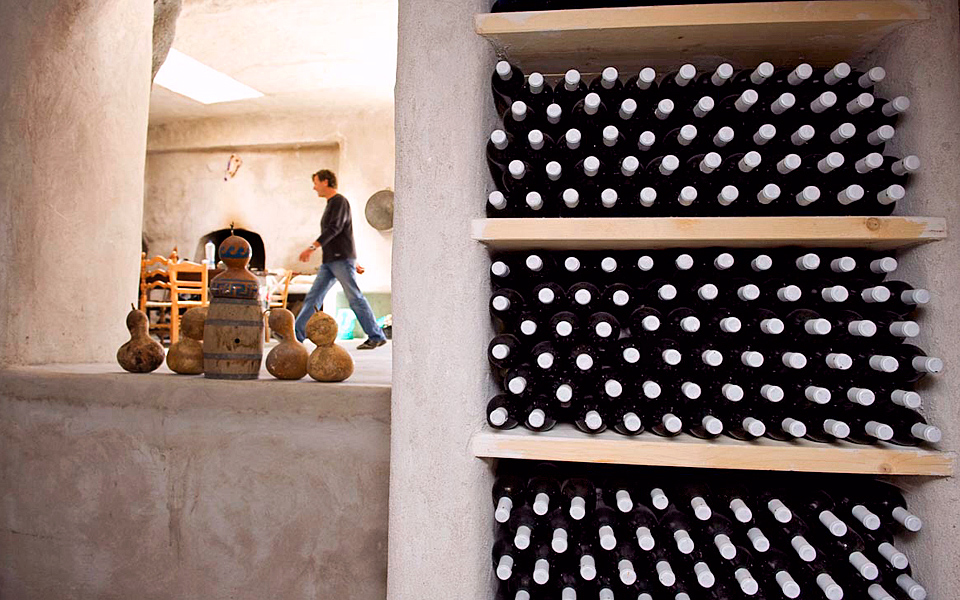
© Evelin Foskolou
5. KONSTANTAKAKIS CAVE WINERY, MILOS
The charming fishing village of Apollonia on the north-east coast of the island of Milos is home to the vineyards of the Kostantakis Winery. This is where Kostas Mallis (Kostantakis as he is known on the island) makes three wines: Selection, which is a blend of Assyrtiko and Savvatiano; Spilia white, a blend of Savvatiano and Roditis; and Spilia rosé, a blend of Mandilaria, Roditis and Muscat. Vines flourish in the island’s volcanic soil and the vinification process uses traditional methods including wild fermentation. The winemaker’s immediate plans include the upgrading and modernization of the winery. Under the careful supervision of enologist Christos Kanellakopoulos, approximately 5,000 bottles are produced annually, at least for the time being, and they are sold exclusively on the island.
[To arrange a visit, call: Tel. (+30) 22870.41125]

© Evelin Foskolou
6. SYROS WINERY
Nikos Hatzakis, winemaker and oenologist, established his winery in the area of Talanta, not far from the island’s main town, Ermoupoli, in 2011. The winery currently produces three wines: the white San ta Maratha, a single variety wine made from Assyrtiko; Fabrica White, a blend of Monemvasia and Kountoura; and Fabrica Red, a light fresh wine made from Mandilaria. Hatzakis plans to plant his own vineyards in the near future, but for the time being he uses grapes grown by farmers at Platy Vouni, Syros and at Naoussa on Paros. The wines are sold at several outlets on Syros and Tinos, at the Andriakon Pantopoleion on Andros and at some wine shops in Athens.
[To arrange a visit, call: Tel. (+30) 6946.302.920]
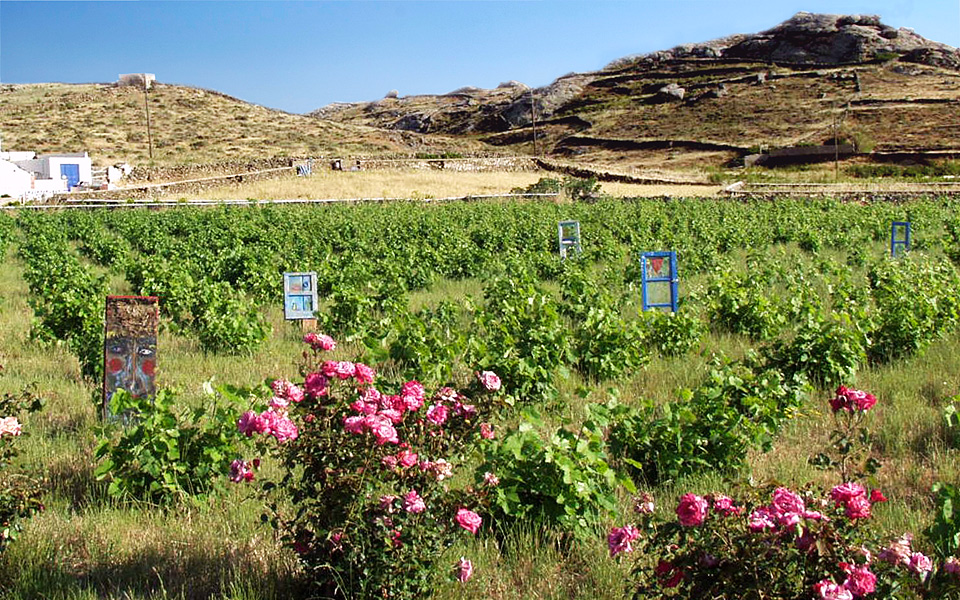
© Efi Paroutsa
7. MYKONOS VIOMA, ORGANIC FARM & VINEYARD, MYKONOS
The yield from the dry farmed vineyards of the monastery of Panagia Tourliani at Maou, Ano Mera is never high, and Nikos Asimomitis, who has relied on the monastery’s grapes to make his three wines for over two decades, has never produced more than 17,000 bottles.
Still, the vines – covering almost 11 acres – are well looked after using organic/biodynamic methods, with classical music played to them from speakers interspersed between the vines to keep them happy and healthy. The well-bred grapes return the love and attention by giving birth to the white Paraportiano wine, a blend of Assyrtiko and Athiri; the red Paraportiano, a blend of Mandilaria and Ayiannitis; and the Heliofilos, a sweet wine from sun-dried raisins combining Mandilaria Red and Malagousia White. The company does not have a winery, so vinification takes place elsewhere, but visitors are welcome to watch the harvest activities and sit under the pergola right next to the vines, sipping wine and tasting fresh produce from the farm. Mykonos Vioma also produces vinegar, vine leaves, petimezi (grape molasses), honey and organic vegetables.
[To arrange a visit, call: Tel. (+30) 22890.71883 | www.mykonosvioma.gr ]
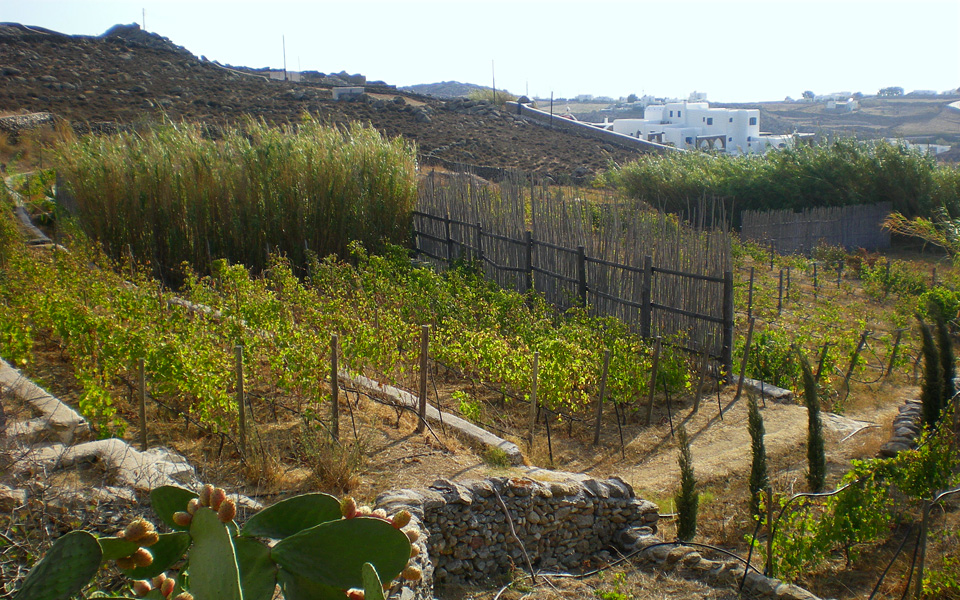
8. KIPOS XYDAKI, MYKONOS
Giorgos Xydakis, a dentist and vintner, makes around 2 tonnes of wine annually. His is a small vineyard – no more than 1,000 vines but what a wealth of local varieties it encompasses: Pariano, Kountoura, Serfiotiko, Potamisi White and Black, Askatharia Black, Kouforrogo, Xeromahairoudes and others. Located between Kalamopodi and Plyntri, it supplies some of the grapes used to produce four bottled wines. The rest are supplied by other growers on Syros, Tinos and Naxos. Depending on the year, different varieties may be blended in varying proportions to create the wines. Triambelos is a white wine, usually produced from Monemvasia, Serfiotiko and Kalamarkouda. Part of this blend matures in barrels to yield Triambelos Vareli. Mikri Koutela is a red wine from Potamisi Black and other indigenous varieties. Xydakis also makes two dessert wines: the red Guru, made from Kountoura raisined grapes, and the white Taro from Monemvasia. Both the vineyard and vegetable garden (which provides all the fresh produce Xydakis needs to make his goodies: small quantities of spoon sweets, jams, lemonade, pickles, aromatic herbs, herbal teas and vinegar) are certified by DIO, a Greek certification body for organic products). The wines and other produce can be found at several places on Mykonos (including Menayias butcher shop, Cava Brouzos, Marietta Ploumistou grocery and Sale e Pepe restaurant), Syros (at Kritsini’s) and Andros (at Andriakon Pantopoleion).
[The winery is not open to the public.]
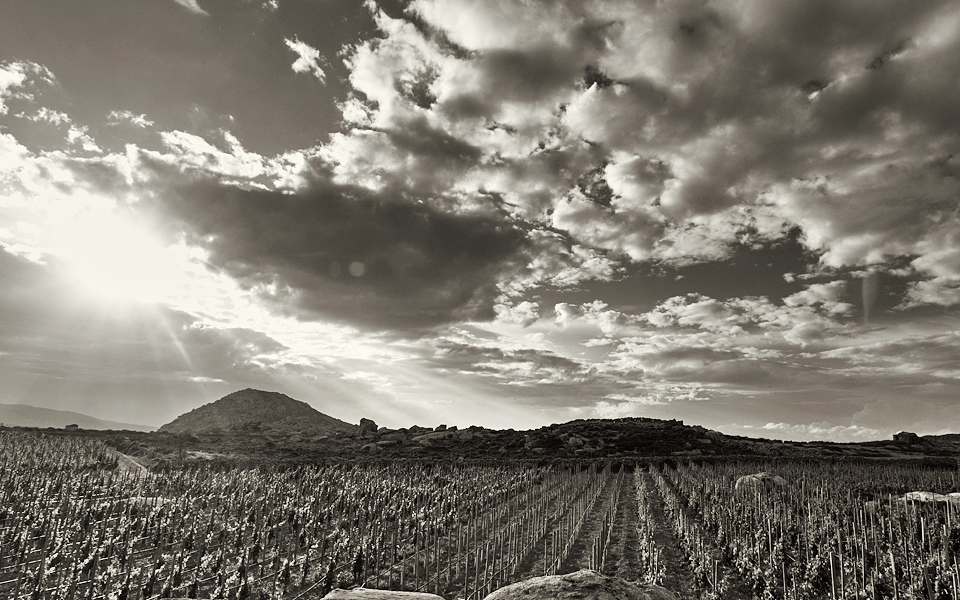
© Tiniakoi Ampelones
9. TINIAN VINEYARDS
It took Alexandros Avatangelos three years to plant the vineyards between 2002 and 2005, but he was supported by quite a team: chief enologist Thanos Fakorelis, special consultant enologist Nadine Gublin, enologist Eleni Alevra and the “general” in the field, Michalis Tzanoulinos. At an altitude of some 450 meters around Falatados are 25 acres planted with Assyrtiko, Mavrotragano, Malagousia and Avgoustiatis. The small but modern winery sits in the middle of one of the vineyards. The first grapes were harvested in 2008, and annual production recently reached 15,000 to 17,000 bottles of four wines branded T-Oinos; three are varietal wines and one is a blend of Mavrotragano and Avgoustiatis. They can be found at a number of sales points throughout Greece but most of the wine is exported.
[To arrange a visit to Tinian Vineyards (Tiniakoi Ambelones), call: Tel. (+30) 22830.41120]
10. FONSOS WINERY, TINOS
A mere 3,500 bottles is the winery’s annual yield and it is barely enough to meet demand on the island. The small winery of Christos Fonsos in the area of Komi was founded in 1997. Three labels are produced: Mpeloni, a varietal red from Potamissi Black; Mathioulis white, a blend of local varieties including Potamissi, Monemvasia and Muscat; and Mathioulis red, made from the co-fermentation of Koumariano and Potamissi Black. The vineyards, three acres in all, boast some of the oldest Monemvasia vines in the country, since they have never been hit by phylloxera. The wines are sold mainly on the island.
[To arrange a visit, call: Tel. (+30) 6977.668.060]
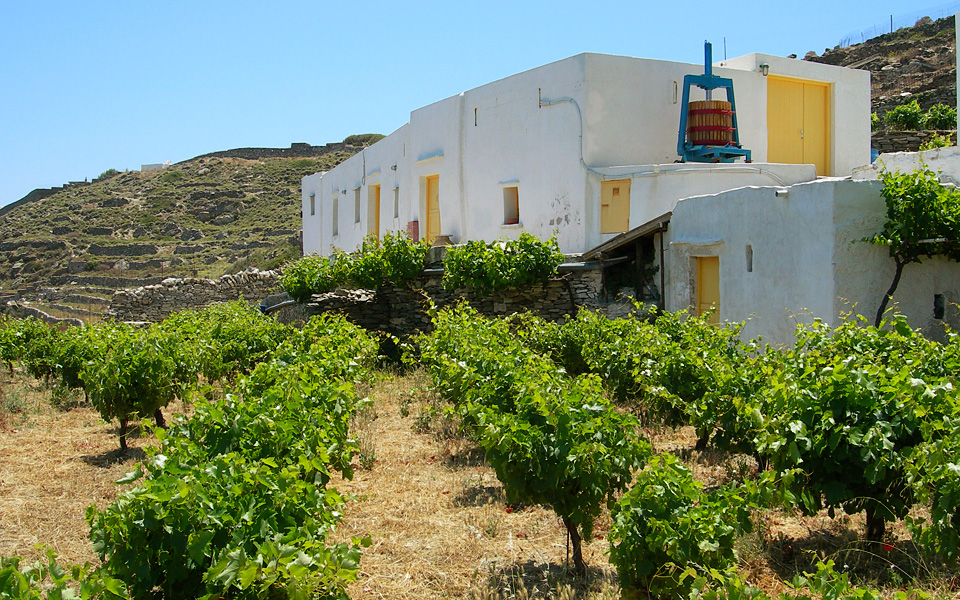
© Evelin Foskolou
11. VOTSARI WINES, SIFNOS
Dimitris Votsaris studied enology and has been tending vines and making wine on Sifnos for over a decade. On his five vineyards covering five acres he employs dry farming and organic methods. Dry farmed, organic vines can be whimsical, so quantities fluctuate greatly; in one year he may have just 3 tonnes of grapes to press into must, and in another as much as 14 tonnes. Situated on the north-east coast of the island, the winery is modern and well equipped. It produces three varietal wines, two whites – one made from Savvatiano and the other from Assyrtiko, plus a red Mandilaria. In some years there is even a dessert wine, a blend of Mandilaria and Savvatiano. The wines are sold on Sifnos and at Farmer’s Republic in Athens.
[The winery is not open to the public.]
12. CHRYSOLORAS VINEYARDS, SERIFOS
On Serifos, in the area of Flaskos, Christos Chrysoloras tends to his dry farmed, organic, TUV Austria certified vineyards, and they reward him with grapes, chiefly of the Serfiotiko variety, for the production of his bulk wine. A small modern winery, which will allow him to bottle, is not yet ready. Christos also vinifies other varieties: Mandilaria, Monemvasia, Tsampato, Psarosyriko, Platyrracho and Aidani.
The young vine grower set up the island’ s first winery this year and its first wines will soon be available – a white wine made from local Serfiotiko variety and a dry rosé from Mandilaria grapes, both under the brand name of Xiro Horio -“dry village.”
[[To arrange a visit, call: Tel. (+30) 228.1051.216]

